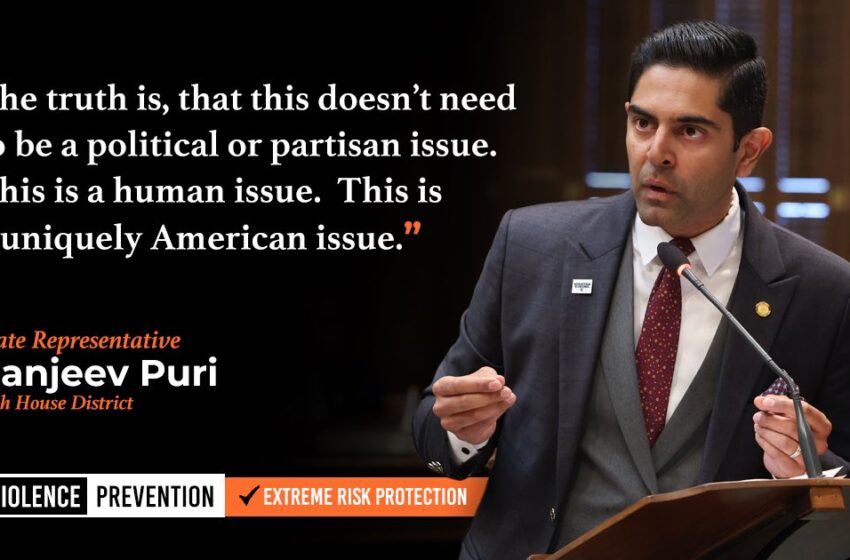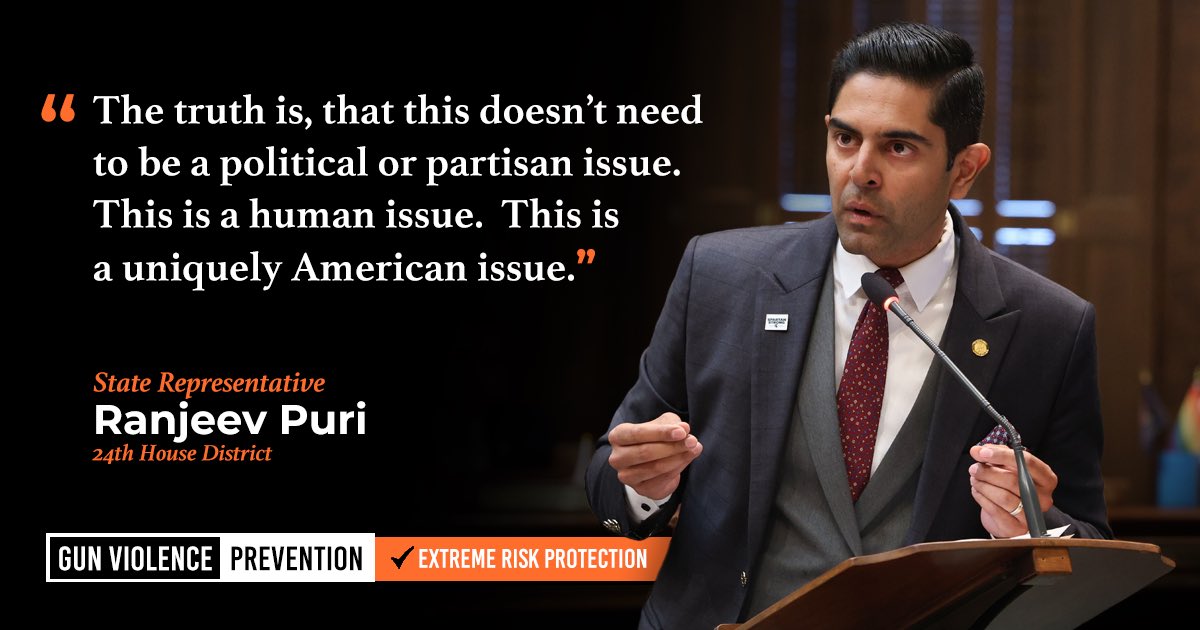Michigan State Rep Ranjeev Puri’s bill expands hate crime definition


Puri recounts how a hate crime during his childhood shaped his ambition to bring in positive changes to America
Indian American Michigan State Representative Ranjeev Puri, now serving as Michigan House Majority Whip, has been taking up social issues vociferously in his second term in the state legislature.
In February this year, Puri released a strongly worded statement after the Michigan State University shooting incident where a shooter opened fire.
READ: Indian Americans win big in Democratic primaries for state houses (August 4, 2022)
“F*ck your thoughts and prayers…, is how he opened his statement asserting “We do not need to live like this. The United States is the only country where this happens. Where mass shootings have left us desensitized.”
More recently, Puri, introduced a bill that proposes to expand the definition of hate crime. His bill also proposes to recognize vandalizing religious places as hate crime.
The Indian-American legislator has also talked about acknowledging Diwali, Eid-ul-Fitr, Eid-ul-Adha, Vaisakhi and Lunar New Year as official state holidays in Michigan.
At a time when diversity at political levels is important to make America a more inclusive, welcoming place, Puri’s efforts are both much-needed and timely.
Taking time out of his tight schedule during the ongoing budget session of the Michigan legislature, Puri talked to the American Bazaar about how a hate crime during his childhood shaped his ambition to bring in positive changes to America and how diversity and representation are making great strides in Michigan.
AB: You have been a member of Michigan House of Representatives since 2021 and are also house majority whip. As a politician of Indian heritage in the US, what would you say about political engagements of the immigrants, particularly Indian Americans in the country today?
RP: Our Democracy only gets stronger as more people are represented in office. Immigrants bring a new perspective to our country, and are a foundation to the success of our great nation.
It is important we find ways to engage more people in our civic process. We are making strides in Michigan, we have deliberated ideas of creating holidays for election days, translating ballots into multiple languages, and making voting more accessible for all Michigan residents.
We must continue to find ways for our institutions to evolve and cater to the needs of our residents. I hope to see an increase in participation from our immigrant communities, as we continue to improve the civic process.
READ: Sikh community welcomes Pennsylvania House panel approval of anti-hate crime bills (May 25, 2023)
AB: You recently introduced a bill to identify defacing places of worship as a hate crime. Talk to us more about it?
RP: Unfortunately, in recent years, we have seen a spike in hate crimes against the Indian-American and Asian-American communities. Although a majority of hate crimes go unreported, recent data shows that ethnic and religious minority communities are often among the most targeted.
Michigan currently does not have the legal tools to prosecute these crimes. The initial “hate crime” laws from 1988 have never been updated, making it difficult for prosecutors to successfully convict crimes as hate crimes.
This legislation would expand the definition of who and what is protected under the hate crimes laws, and also provide more leeway for the courts to respond to these vicious and hateful acts with the heavy-handed nature they deserve.
Michigan is becoming more inclusive, and it is time our laws honor and appreciate the multi-ethnic fabric that makes up Michigan.
AB: You also introduced a bill to establish Diwali, Eid, Vaisakhi, Eid ul-Adha and Lunar New Year as official state recognized holidays in Michigan. This is an excellent step. Tell us about it?
RP: Michigan is home to a diverse population, and Indian Americans have played a significant role in shaping our society, economy, and culture. By officially recognizing their holidays, we can foster inclusivity, promote cultural understanding, and strengthen the bonds that tie our communities together.
Recognizing Indian American holidays as official state holidays holds several important benefits. First and foremost, it demonstrates our commitment to embracing diversity and promoting equality.
Our state should be a place where all communities feel valued and respected, and this legislation is a positive step towards achieving that goal. Celebrating Indian American holidays will provide an opportunity for cultural exchange and education.
By designating these holidays as official state holidays, we encourage residents of all backgrounds to learn about the traditions, customs, and rich history of the Indian-American community. This can foster a sense of unity and appreciation for the multicultural fabric of our society.
Read: Sikhs, Jews most targeted for hate crimes: FBI (February 23, 2023)
AB: You grew up in the US at a time when there was not so much diversity. Did your growing up years make you also feel that there is a need for representation. Did it influence your political career?
RP: As an Indian-American, I can speak from personal experience about growing up in a time of little diversity and the perspective it has provided me in my journey towards running for office and fighting for change.
Growing up, I often felt like an outsider due to my ethnic background. I grew up in small town Wisconsin, surrounded by not many people that looked like me.
Being in an environment with limited diversity also made me realize the importance of representation. I rarely saw individuals who looked like me in positions of power or leadership, which led to a feeling of invisibility and a sense that my voice and experiences were not valued.
This experience fueled my determination to step up, challenge the status quo, and work towards creating a more inclusive and equitable society.
Running for office became a natural course of action for me because I wanted to be a voice for those who had been marginalized and underrepresented.
I wanted to fight for policies that address systemic injustices, promote diversity, and create opportunities for all individuals, regardless of their background.
Indian Americans are still underrepresented in politics. In Washington DC, the five Indian American Representatives call themselves the Samosa caucus. Last year In Michigan, we had our own Samosa caucus, but our friend Congressman Thanedar moved on to represent us in DC, and sadly Padma Kuppa is no longer with us.
So now I am unfortunately, the only Indian American in the Michigan House. I am joined by my friend, Senator Sam Singh in the Michigan Senate though.
I am dedicated to working towards a more inclusive and equitable Michigan, where every individual, regardless of their background, has an equal opportunity to thrive and contribute to our great state.
AB: Vandalizing, unfortunate killings at religious places must be a matter especially close to your heart. Your father helped establish the first Sikh Gurdwara in Wisconsin. Wisconsin is also the place where Oak Creek shootings happened. It was a traumatic moment for the community. So, what measures do you suggest should be in place to ensure no community feels unsafe in America?
RP: First and foremost, we must prioritize the enactment of comprehensive legislation that addresses the root causes of insecurity and promotes safety for all communities. This includes strengthening and enforcing laws against hate crimes, discrimination, and harassment.
We must ensure that our legal framework provides appropriate penalties for those who perpetrate acts of violence or intimidation based on race, ethnicity, religion, or any other protected characteristic. As I mentioned, I recently introduced legislation to do just that.
Education and awareness also play a vital role in making things better. It is essential to promote diversity, inclusion, and cultural understanding in our schools, workplaces, and broader society.
Read: FBI reports over 7,000 hate crimes in America in 2021 (December 15, 2022)
This can be achieved through educational programs, workshops, and events that encourage dialogue, challenge biases, and promote empathy.
By promoting a culture of acceptance and understanding, we can counter stereotypes, prejudice, and ignorance that contribute to feelings of insecurity and discrimination.
Moreover, we must amplify the voices of marginalized communities and ensure their concerns are heard and addressed. This includes providing platforms for community leaders, advocates, and individuals affected by insecurity to share their experiences and propose solutions.
By actively involving those affected, we can develop targeted policies and initiatives that address specific challenges faced by different communities.
Finally, it is important to remember that creating a safe and inclusive society is an ongoing process that requires collaboration and continuous evaluation.
Regularly assessing our policies, listening to feedback from communities, and adapting our approach accordingly is crucial. We must be willing to learn, evolve, and take action based on the needs and concerns of those we serve.
